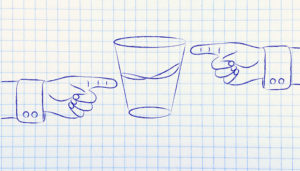Care Management Blog
Communicating with aphasia
If your loved one suddenly developed difficulty with speaking, he or she probably has aphasia, typically from a stroke or traumatic brain injury. Slow or garbled speech can be frustrating for everyone. Recovery is enhanced by following the advice of speech and occupational therapists. Your support is invaluable in terms of bolstering self-worth and confidence.…
Read MoreGetting out of the mental spin cycle
Do you find yourself in a repetitive cycle of reliving an exchange over and over? Reflecting on experiences gone badly is one way we learn. We think about what happened and look for insights that might promote a positive outcome in a similar situation next time. But sometimes reflection can be unhealthy. If you find…
Read MoreCommon elder scams
Financial abuse of the elderly is thriving. Advise your loved ones to be on the alert for these common scams: Government impostorsIndividuals call saying they represent Social Security, Medicare, the VA, or the IRS. They describe a problem with an account. Or taxes owed. Then they ask for name, date of birth, and Social Security…
Read MorePlan ahead when downsizing
Moving into a smaller living situation is a big decision. More emotionally challenging, however, are the many little decisions your loved one must make about what to keep and what to let go. Possessions, from knickknacks to garden tools, hold many dear memories. Letting go of them is like discarding the people or events they…
Read MoreDistraction techniques
If the person you care for has a problem with memory loss (dementia), you may find that he or she gets agitated about things that don’t make sense. Your long-retired dad, for instance, may wake up in the mornings and insist, “I have to go to work!” It can be confusing for you. And frustrating!…
Read MoreThe value of nostalgia
Nostalgia has historically gotten a bad rap, viewed as a precursor to feelings of sadness and longing. Emotional downers. Today we know that’s a faulty assumption. Research shows that nostalgia typically brightens mood. This is because nostalgia helps us in many ways: Focus on the positive in our past. People, events, places. We remember good…
Read MoreWhat is an occupational therapist?
Eating, dressing, getting in and out of a chair. In the course of daily life, we use many skills to accomplish even “simple” tasks. Walking or using a fork is surprisingly complex. Nerve signals and muscles have to coordinate in a very specific order. A healthy body is a marvel! We take these skills for…
Read MoreWhen language falls apart
One common outcome of a stroke or other brain injury is the sudden loss of ability to process language. This disability is called “aphasia” (ah-FAY-zya). Depending on which part of the brain has been damaged, the affected person may have trouble speaking or trouble understanding. Or may have difficulty with reading or writing. Needless to…
Read MoreAging and the self-fulfilling prophecy
“Whether you think you can, or you think you can’t—you’re right.” —Henry Ford It turns out this truism applies to the ways we perceive the aging process itself. Research shows that older adults who view aging as a time of continued learning and development are physically more resilient. They seem to weather a setback and…
Read More








